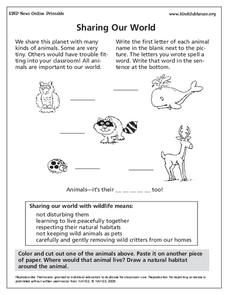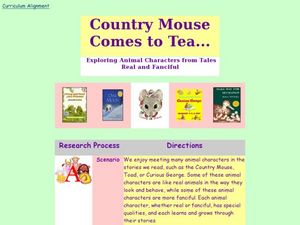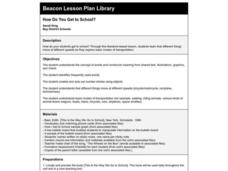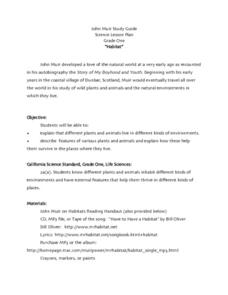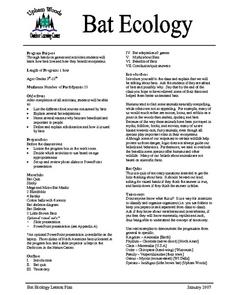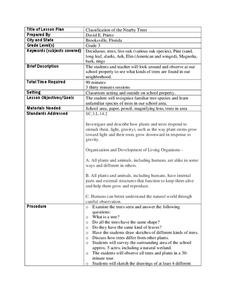Curated OER
Food Chains and Food Webs
Fourth graders investigate food chains. In this living environment lesson, 4th graders begin to understand the interdependence of organisms. Students describe the connections organisms have to the ecosystem. Students research online,...
Curated OER
Locating the Salt Front - Section 1
For this salt front of the Hudson River worksheet, 7th graders first read an excerpt about the lower portion of the Hudson River that is an estuary. Then they use a colored pencil to plot salinity data from the table shown on a graph,...
Curated OER
Mapping Animal Behavior
Young scholars discuss the value of sampling in science. They, in groups, map cricket movement in response to various stimuli and graph their results.
Curated OER
Sharing Our World
For this science related worksheet, students explore how we share the planet with a variety of different animals. Students then write the first letter of each of the five animals shown in the blanks next to each picture.
Curated OER
Have to Have a Habitat
Learners create a zoological and botanical garden made up of a variety of species from around the world.
Curated OER
Animals of Madagascar
Students are each assigned an animal from Madagascar. They research their animal and design a picture book about their animal. Students design a cover page, back page, bibliography page and the title page. Their book will contain...
Curated OER
Impacts to the Open Ocean
Students investigate how human beings impact ocean ecosystems. In this ocean ecosystem lesson plan, students explore how marine debris affects marine life. Internet resources are provided.
Curated OER
COMMON KINDS OF INSECTS
Young scholars will recognize and name three common insects.1. Share background information with students. 2. Provide young scholars with the "bug body" puzzle pages, and have them cut the puzzles out.1. Share background information with...
Curated OER
Country Mouse Comes to Tea: Exploring Animal Characters from Tales Real and Fanciful
Students study animal characters. In this language arts lesson, students analyze animal characters from a variety of books and create a story using animal characters.
Curated OER
How Do You Get to School?
Students, through a literature based assignment, explore basic modes of transportation and examine how different things move at different speeds.
Curated OER
Learning From Leaves: Adaptations To Differing Light Levels
Students, in groups, examine plants with different light levels. They are given plants from a tropical and desert region. They write a hypothesis at the beginning of the experiment.
Curated OER
Cats: Reading Comprehension
In this reading comprehension worksheet, 2nd graders will read a paragraph about cats and answer four multiple choice questions about the passage.
Curated OER
A Chicken's Life
Here is a set of comprehension questions that go with the story "A Chicken's Life." Learners answer each of nine questions by filling in the blank with the correct word then, they complete ten additional comprehension questions that...
Curated OER
Can You Do It? I Can Do It!
Students imitate the same movements that different animals would make.
Curated OER
Furbearers of Illinois
Students study fur bearing animals of Illinois. They research a specific furbearer (it's habitat, diet, current hunting regulations regarding the animal, conservation organizations that help the animal, etc.) and give a presentation on...
Curated OER
Is This a House for Hermit Crab?
First graders identify text that uses sequence or other logical order. They identify and interpret how different plants and animals inhabit different kinds of environments and have external features that help them thrive in different...
Curated OER
"Habitat'
First graders explore and explain that different plants and animals live in different kinds of environments. They illustrate various plants and animals and how they survive in the places where they live. A nature journal for enrichment...
Curated OER
Unique Ecosystems
Fourth graders explain how in any particular environment, some kinds of
plants and animals survive well, some survive less well, and some cannot survive at all. They research the ecosystem of which each animal or plant is natively a part.
Curated OER
Bat Ecology
Young scholars, through hands on games and activities, discover how bats live and how bats benefit ecosystems. They play a game designed to show them how echolocation works and another to show how mother bats locate their young through...
Curated OER
Measuring Biodiversity
Students explore a few key concepts associated with measuring biodiversity. They are told that biodiversity can be measured in a number of ways. Genetic diversity is a measure of the genes represented in the sample. Ecosystem...
Curated OER
Charlotte's Web
Fourth graders focus on fluency by reading the book Charlotte's Web. In this reading strategies lesson plan, 4th graders partner read, do guided reading, and independent reading to increase fluency. Students use Venn Diagrams, discuss...
Curated OER
Beach Life: Spanish Banks Field Trip
Students discover beach life. In this beach life lesson, students visit a beach to find plant and animal species that live there. They discuss the life cycle and needs of some of these animals through a variety of activities.
Curated OER
Classification of the Nearby Trees
Third graders practice using classification techniques to identify local trees. In this plant life instructional activity, 3rd graders discuss how trees differ from other plants and what characteristics are unique to trees alone....
Curated OER
Who Eats Who?
Students recognize that some animals eat plants, some eat meat and some both. For this who eats who lesson, students chart animals in a food chain. Students research information from reading articles. Students chart what animals eat...





